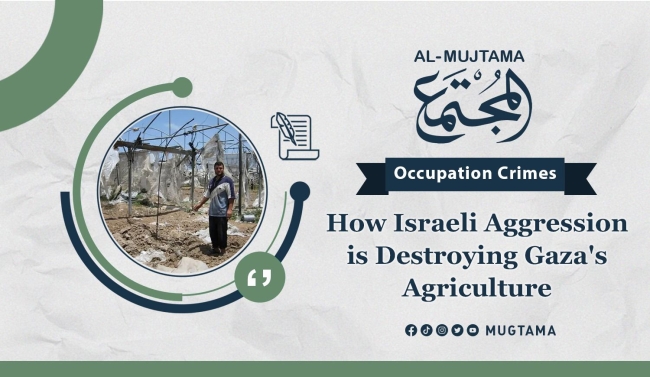How Israeli Aggression is Destroying Gaza's Agriculture Featured
Gaza's Farmer Struggles
Gazan farmer Munir al-Taaban is feeling helpless as he surveys his greenhouse in Deir al-Balah, located in the central Gaza Strip. His tomato seedlings are suffering from extreme thirst because he can't operate the water wells to irrigate them. The war has devastated the agricultural sector, and if things don't improve, famine could be on the horizon. Munir relies on underground wells for water, but the power outage and fuel shortage have made it nearly impossible to access water.
Water Shortage and Crop Damage
Tomato plants need to be watered daily, but now Munir can only water them every three days for a short period of time. This limited water supply is not enough for the plants to thrive. The groundwater reservoir is the main source of water for the majority of Gazans, providing about 94% of their total water needs.
Lack of Fertilizers and Pesticides
Munir also faces a shortage of fertilizers and pesticides, which are essential for healthy plant growth. The prices of these products have skyrocketed, making them unaffordable for many farmers. Munir is worried about pests like bed bugs that could ruin his entire crop, but he can't find any pesticides to control them.
Losses and Challenges
Munir expects to lose around two thousand dollars this season due to the war conditions. He considers himself lucky compared to farmers near the border or in remote areas whose crops have been completely destroyed. Other farmers who raise poultry, cows, and sheep are also suffering huge losses. Some farmers have even had to cull their young birds because they couldn't afford to feed them.
Impact on Vegetable Merchants
The war has also affected vegetable merchants like Ahmed Khattab, who sells vegetables in Deir al-Balah. He believes that agriculture has been destroyed, and many farmers will go bankrupt. Khattab faces challenges in buying vegetables due to the ongoing Israeli raids on Gaza. Transportation has become difficult, and the prices of packaging materials have doubled, leading to higher prices for customers. Some vegetables, especially leafy ones, have become unavailable.
Risk of Famine
Salama Marouf, the head of the government media office in Gaza, warns that the Israeli aggression could completely destroy agriculture. He estimates that 25 thousand dunams of land have been directly targeted and crops have been destroyed. Farmers are unable to reach their lands to water and monitor them, and even if they can, they lack the fuel and electricity to operate the wells. The loss extends to the poultry sector, with a depletion of chicken feed. Ismail Al-Thawabta, the Director General of the Government Information Office, also warns of a famine, particularly in isolated and besieged areas like Gaza and North Gaza.
Losses in the Fishing Sector
The fishing sector has also suffered significant losses. Nizar Ayyash, the head of the Fishermen's Syndicate in Gaza, reports that many boats have been destroyed, leaving fishermen devastated. The damage is severe, and repairs are difficult due to the ongoing conflict. The number of boats designated for fishing in the Gaza Strip is about 2,500, with over 10,000 fishermen relying on them for their livelihood.
Losses and Challenges for Fishermen
Stopping fishing in Gaza has had a huge impact on the local fishermen, according to Ayyash, who works at the Ministry of Agriculture. The data from last September shows that about 20 tons of fish were being caught and exported to West Bank markets every week. This means that a lot of money is being lost by not being able to fish anymore. Ayyash also mentioned that the fishermen are very poor and rely on fishing for their daily livelihood. If they can't fish anymore, they might not have enough food to eat and could starve.
Destruction of Fish Wealth Projects
The Director General of the Government Information Office explained that the occupation not only stopped fishermen from working in the sea, but also destroyed fish farms that were worth millions of dollars. These fish farms were important because they provided jobs for people and helped increase the fish population. Unfortunately, some of the workers in charge of these fish farms were killed, and the fish were left to die. This led to a decrease in the number of fish in the fishery because there was no one to take care of them.
Prevention of Fishing and Loss of Lives
Al-Thawabta, another official, mentioned that the Israeli army completely prevented fishermen from working. They even shot at some fishermen who tried to fish for a living. This has led to the death of several fishermen in the southern governorates of the Gaza Strip. As a result, thousands of fishing workers are now facing hunger because they are unable to practice their fishing profession. They can't provide for their families, and their family members are at risk of starvation due to the ongoing war.


